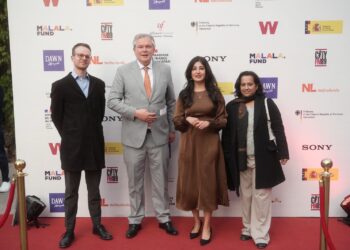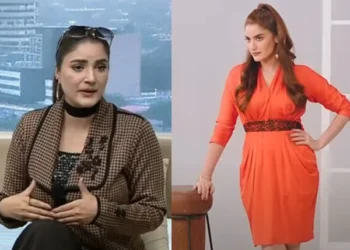Introduction: The Hidden Side of Glamour
Pakistani actress and dancer Meher Bano, known for her bold personality and fearless social commentary, has made a powerful revelation regarding the prevalence of harassment and inappropriate demands within the Pakistani entertainment industry. Speaking on a talk show hosted by comedian Tabish Hashmi, Meher Bano shed light on the dark underbelly of showbiz, where both male and female artists are subjected to harassment, exploitation, and undue pressure from powerful industry figures.
The actress’s candid account has sparked a broader conversation on social media, once again bringing attention to the urgent need for accountability, transparency, and reforms within the Pakistani entertainment world.
Meher Bano: A Voice of Courage in a Silent Industry
Meher Bano, who gained fame through the drama “Taxali Gate” and has also performed on international platforms, is known for her confident and unapologetic demeanor. She is among a growing group of Pakistani celebrities who are choosing to speak out about taboo topics such as harassment, mental health, and gender inequality.
Participating in Tabish Hashmi’s popular TV show, she answered a question from a young audience member about the pressures of working in showbiz. Her response, while calm, was deeply revealing.
“Just like every industry has its dark side, so does ours. In showbiz, artists are often forced to comply with unfair and inappropriate demands to get work,” she stated.
Harassment in the Entertainment Industry: A Global Issue
Meher Bano’s disclosure is not an isolated case. Across the world, the entertainment industry has been grappling with the problem of harassment and abuse of power, most notably exposed by the #MeToo movement. From Hollywood to Bollywood, countless actors, producers, and crew members have shared disturbing stories about quid pro quo situations, where opportunities were exchanged for sexual favors or submission to unethical behavior.
In Pakistan, however, such conversations have often been swept under the rug, either due to social stigma, fear of backlash, or lack of institutional support.
By speaking publicly, Meher Bano has added her voice to a slowly growing chorus that includes other Pakistani figures like Meesha Shafi, Hareem Farooq, and Saba Qamar, who have previously discussed inappropriate behavior in the workplace.
Gender-Neutral Harassment: A Rarely Discussed Perspective
One of the most important aspects of Meher Bano’s revelation is her acknowledgment that both men and women are subjected to harassment in the entertainment industry.
“It’s not just women who suffer. Many boys are also victims of harassment,” she emphasized.
This statement challenges a long-held perception that harassment in the media industry primarily affects women. In reality, male actors, dancers, and models—especially those new to the industry or lacking influential contacts—are often vulnerable to similar forms of exploitation. However, due to toxic masculinity and fear of social judgment, most male victims choose to remain silent.
Meher Bano’s candid observations help bring much-needed visibility to these gender-neutral exploitation patterns.
Beauty as a Double-Edged Sword
The actress also pointed out how physical appearance, which is often seen as an asset in showbiz, can turn into a liability. The entertainment industry’s obsession with beauty, glamour, and allure often objectifies artists, making them easy targets for harassment.
“In this field, beautiful faces and charming personalities often fall victim to exploitation,” she said.
Her statement brings attention to how objectification and hyper-sexualization play a role in the abuse of power within entertainment ecosystems. This creates a work culture where professional boundaries are blurred, and people in power feel entitled to make personal or sexual demands.
The Culture of Silence and Fear
The Pakistani entertainment industry, much like other sectors in the country, suffers from a culture of silence when it comes to confronting issues like sexual harassment. Victims often fear:
- Loss of career opportunities
- Social shaming and victim-blaming
- Legal loopholes or lack of justice
Due to these challenges, very few artists come forward to share their experiences. When they do, as seen in the case of Meesha Shafi’s legal battle with Ali Zafar, the response can be aggressive and polarizing.
Meher Bano’s courage in speaking out despite these risks highlights the need for stronger support mechanisms, such as artist unions, grievance redressal committees, and legal protections.
Industry Reactions: Support and Shock
Following Meher Bano’s revelations, social media erupted with responses from fans, critics, and fellow actors. While some praised her bravery, others expressed shock at the extent of exploitation in the industry. Hashtags like #JusticeForArtists, #EndHarassmentInShowbiz, and #MeherBano began trending on Twitter.
Many industry insiders expressed solidarity and called for code-of-conduct policies, whistleblower protections, and safe reporting systems to be instituted across production houses and networks.
Legal Frameworks and Institutional Gaps
Although Pakistan has laws such as the Protection Against Harassment of Women at the Workplace Act (2010), enforcement in sectors like entertainment remains weak and inconsistent. Most TV channels, modeling agencies, and production companies do not have internal inquiry committees as mandated by law.
Furthermore, freelancers and contract-based workers, who form the backbone of the entertainment industry, often fall outside the legal purview of workplace protection laws. This leaves hundreds of actors, dancers, writers, and crew members vulnerable to unchecked exploitation.
The Way Forward: A Collective Industry Response
Meher Bano’s revelations serve as a wake-up call for the Pakistani entertainment industry. It is clear that there must be a collective push for reform and protection.
Some potential steps include:
- Establishing an independent grievance cell to address harassment complaints in showbiz.
- Mandatory gender-sensitivity and harassment awareness workshops for casting directors, producers, and actors.
- Forming an artist’s union that lobbies for safe and ethical working environments.
- Encouraging whistleblowers and protecting victims through anonymity and legal support.
- Creating inclusive codes of conduct across all entertainment platforms.
Meher Bano’s Impact: More Than Just Words
While many celebrities choose to avoid controversy, Meher Bano’s boldness has reignited crucial conversations about ethics, respect, and safety in the entertainment world. Her decision to talk about this sensitive issue not only highlights the power of individual voices but also reflects the potential for change when those in the spotlight speak responsibly.
Her narrative is a reminder that the glitter of the spotlight often masks the grit of reality—and that real reform begins when silence is broken.
Conclusion: Turning Pain into Progress
The glamour of showbiz may attract thousands of hopefuls, but as Meher Bano has revealed, it often comes with invisible costs. From inappropriate demands to gender-based harassment, the journey in the entertainment world is not always as easy as it appears on screen.
But by speaking up, Meher Bano has opened the door for honest conversations and industry-wide reflection. It is now up to producers, networks, government bodies, and fellow artists to take her words seriously—and to ensure that no artist has to choose between dignity and career.

























